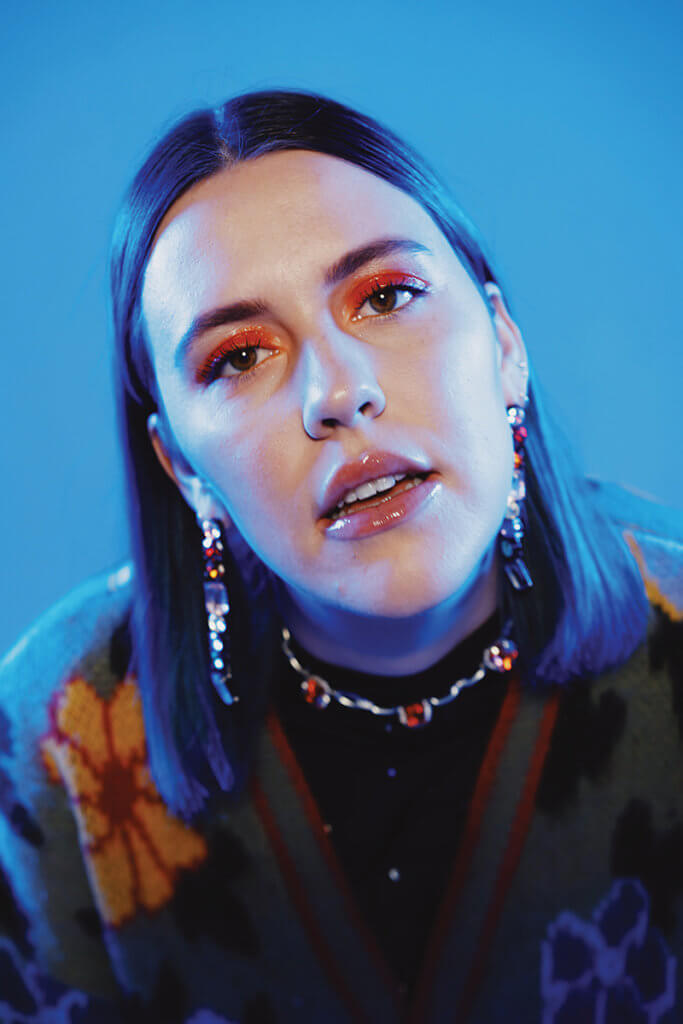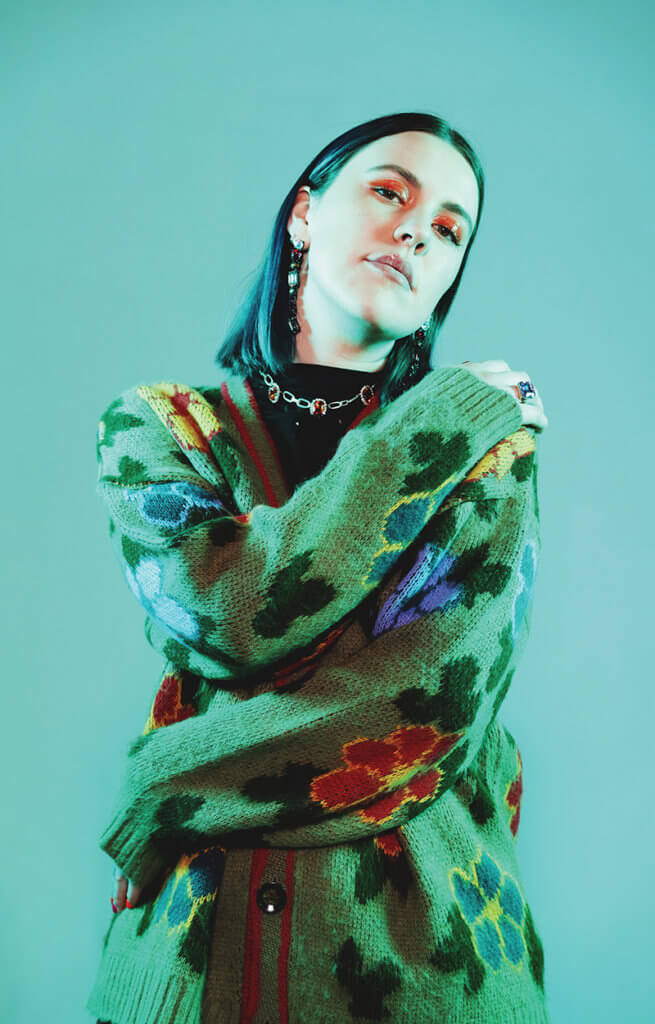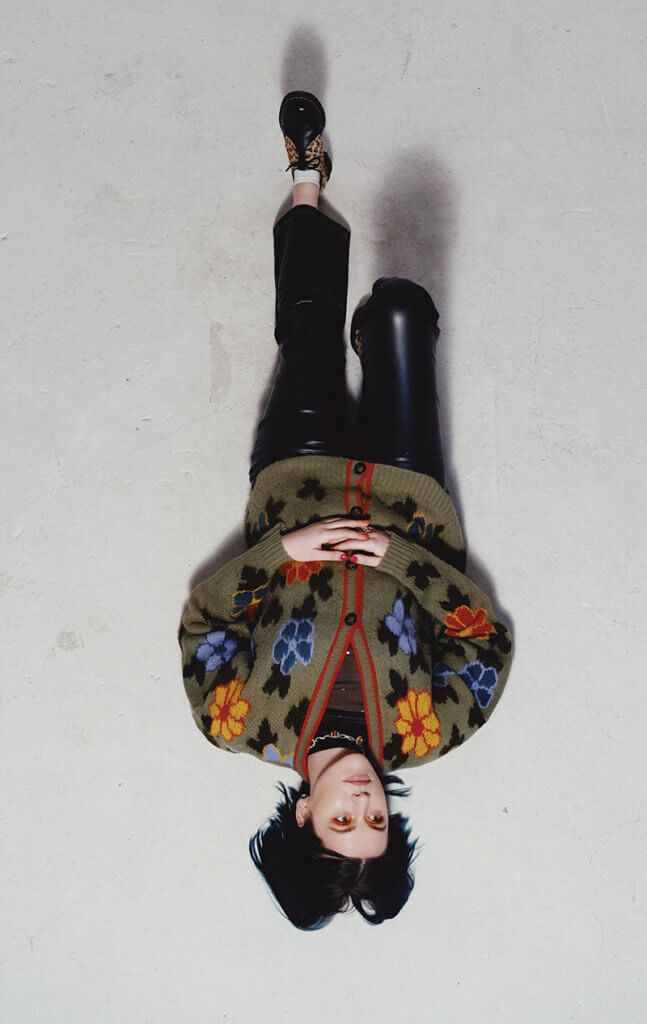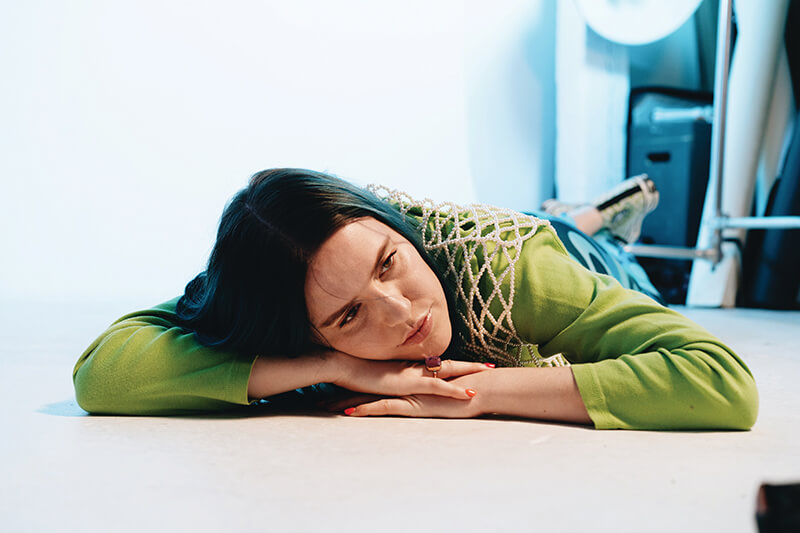Over the last decade, few places in the country have grown as fast or as much as Nashville. Following a remarkable population boom in such a short period, the Tennessee state capital has become a magnet for aspirational Gen-Zers and Millennials, many of whom have flocked in droves to the burgeoning Southern mecca with the hopes of striking it big in the region’s long-established music industry. Among this sizable and far-flung influx of creatives is 23-year-old Lexi Aviles.
A native of Orange County, California, Aviles has spent the last five and half years sedulously cutting her teeth in the Music City’s tight-knit but flourishing indie-pop community. A studious pupil of ’90s electro-pop, Aviles has developed a distinctively open-minded approach that carefully seeks to fuse the many musical currents that flow through Nashville’s fast diversifying music scene. For this purpose, she has adopted the stage moniker of Love You Later, an aesthetically heterogeneous and retro-forward project she’s been steadily evolving since the release of her first single, “Lost in Los Angeles,” back in 2017.

Processed with VSCO with av4 preset
Thanks to a deft vocal command, along with a meticulously curated sound that favors lush yet approachable arrangements, Aviles has rightfully earned the attention of both colleagues and critics across the music industry. In the last few years, she has enjoyed opening stints for notable pop acts like Dayglow and OneRepublic. And in the last few months, her latest single, “Keepintouch,” released in March of this year, gained considerable traction among users of the popular social media app TikTok. As a result, Love You Later’s increasing popularity has been mirrored by a steady uptick in monthly listeners on Spotify and followers across all major social media platforms.
I caught up with Aviles and discussed her musical origins, her opinions on where she sees the music industry in the age of social media, and her evolving creative process.
How long have you been playing music?
Lexi: I’ve been involved in music pretty much since I could walk and talk. As a kid, I used to be in musicals and was also in choirs and talent shows before eventually also going to a songwriting camp. I literally used to make up songs in the back of my mom’s car in my car seat. But I guess I started taking music seriously when I started going to these songwriting camps when I was about 12 or 13. That’s when I figured out that it’s really fulfilling to create my own songs and tell stories about my own life. Love You Later came a bit later in 2017, and that’s when I knew that this was it, that this was what I wanted.
Do you come from a musical family or background?
Lexi: My family is musical but they never took it seriously. My dad was in bands growing up and my mom did singing competitions but it was always pretty recreational.
Who were some of your musical influences growing up?
Lexi: Fleetwood Mac, for sure. Definitely female country artists like Shania Twain and Dolly Parton. I used to also listen to a lot of Journey, Queen, and David Bowie when I was growing up too. Those are some of the artists that actually inspired Love You Later.

Processed with VSCO with 4 preset
When was it that you decided to pursue music as a career and how did that come about?
Lexi: Probably around the time when I started writing my own songs is when I realized that this was what I wanted to do.
What’s interesting about your sound is that it’s a richly layered brand of indie pop, but you’re based in Nashville which is traditionally associated with country music. What has your experience been in the Nashville scene as an indie-pop artist? Has the scene there influenced your sound at all?
Lexi: In a lot of ways it’s a challenge because there’s not a huge community, but it’s also really great because it’s small and close-knit. Everyone’s really supportive of each other and it’s cool because the scene is also really diverse, genre-wise. There are a lot of different sub-genres and lots of different people in those groups, and everyone always comes together because, in a way, we’re sort of like this small fishpond in this big pool of mostly country, Americana, and bluegrass. I can say, though, that it’s growing rapidly. There are lots of people moving here from L.A. and from New York. It’s a really great spot, and honestly, I just love the community.
By and large, your catalog seems to consist of mostly singles. What drives this decision? Do you see albums as less important than they once were in the age of streaming?
Lexi: I would love to actually do a full album at some point in the near future. I’ve been independent for a long time, and I feel like that’d be a great feat to accomplish. It’s actually been a goal of mine for a while, it just hasn’t felt right yet. I also do like how each single is its own thing and feels like its own thing, especially because I’m such a visual person. When I write a song, I can always see what the music video or the art for it will look like. So, it’s fun for me to just have these songs be their own things entirely.

Processed with VSCO with av4 preset
How would you characterize the evolution of your sound over the last five years?
Lexi: When I first started Love You Later it was more of an ’80s-inspired project. And in a way, I’m kind of still inspired by that era. But now it’s sort of molded into something that grabs inspiration from music from the ’90s and 2000s as well. I think I’m also at the point where I’m figuring out what the staple or the secret ingredient in the sound is. And I think that part of that sound identity has a lot to do with my melodic choices, and also, with what I choose to sing about. I think when you put those two things together that’s when you get what makes Love You Later so unique.
What are some of your current musical influences?
Lexi: I love bands like Frou Frou and Imogen Heap. She inspires a lot of my melodies and I feel like if I knew her, we’d definitely be soul sisters. I also like Natalie Imbruglia, Muna. I love Caroline Polachek, Hippo Campus, and The Japanese House. I have a lot.
Your newest single, “Keepintouch,” is quite the earworm. How did it come about?
Lexi: Last summer, many of my friends were leaving town while other friends were becoming distant because they were in relationships or just leading busy lives. So, it felt like there was a lot that was changing with the people that I loved. My boyfriend was leaving on tour too, for about three months. So, I felt like I was just alone, by myself, which is sort of this weird theme in my life: my friends seem to always be moving away.
And I get it, it’s part of being in your 20s and figuring things out and realizing that this is the time in your life to move as much as you want. So, I was alone and frustrated, but also weirdly having all this time to think. And after a while, I realized that I was selfishly blaming them for why I didn’t feel in touch with myself or content being alone. The song explains the process of me realizing that it’s ok to learn to be alone.
Where did you record it and how was that process in comparison to your earlier work?
Lexi: The process has pretty much been the same for all of my stuff. The majority of the song is usually recorded while I’m writing it. I’ve never worked out of a big studio. I usually just go over to the producer’s studio. In this case, Kyle Dreaden produced this song. We got together for two sessions and had the song done except for the vocals. I then recorded some of the vocals and sent them over and had three of my friends play on it, and yeah, that’s just kind of how it’s always been.
I guess in a way I would say that the project has grown and matured a bit, but not enough that I’d say it’s lost its heart, which is good since I prefer being in a house rather than in a big studio.
The video for the song is quite colorful and visually striking — how did the concept come about?
Lexi: I feel like I really wanted and needed the video to be colorful. I wanted to explore the feeling of there being a lot of space and encapsulate all of the emotions associated with that. So, with the help of Chase Denton, the director, we came up with a concept that captured what I felt needed to be there from the beginning which is that sense of space and longing.
The song has received a decent amount of attention on social media, particularly on TikTok. What are your thoughts on the relationship between social media and artists in this current algorithm-based musical landscape? Do you see it as a positive thing?
Lexi: I honestly go back and forth all the time. I mean, that’s what I like about TikTok: my music can reach people who would otherwise never hear it or for whom it would take a longer time to reach them. In that sense, it’s a great platform. I think that as artists we can’t really hate it. But it’s also a love-hate relationship, I mean, there are so many artists who’ve been working since long before TikTok ever existed. And I go through these phases, like now for instance, when I don’t use it for long periods of time, but then I realize that maybe I should use it because it does help. So, I don’t know. I know that I never want to be known as a TikTok artist. It’s not who I am, it’s not what Love You Later is, and it’s definitely not what I started out as.

Processed with VSCO with a6 preset
What are your plans for the rest of the year as the touring/festival season kicks off?
Lexi: I will probably play some shows in and around Nashville, but as far as touring, that’s not really up to me at the moment. It would be really cool to hop on a tour, but we’ll see. Besides playing shows, I’m always constantly writing. So even if I’m not sure what’s next, I know I’ll definitely be writing a lot.
Any artists you’d like to collaborate with in the future?
Lexi: Muna is a big one. Same with The Japanese House.
Any advice to any up-and-coming musicians out there?
Lexi: Without it sounding too cheesy, I’d say to just stay true to yourself and remember where you came from. No matter how successful you get, people and fans will always connect with someone who’s confident in who they are.
Follow on Instagram @heyloveyoulater
Photos by Audrey Bergeron
